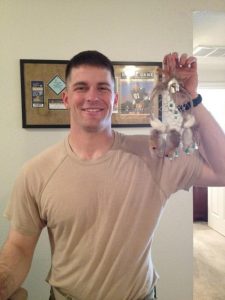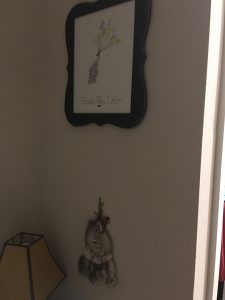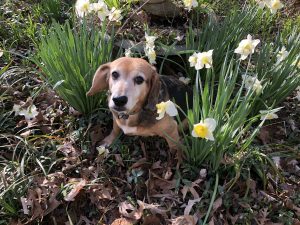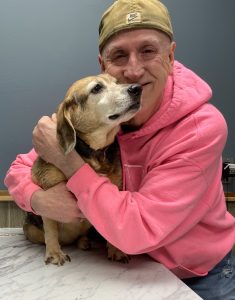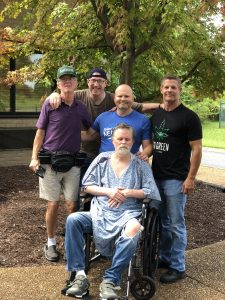One of the lessons—maybe the most important discipline—I’ve learned from being part of Celebrate Recovery (CR) for more than twenty years is the discipline of listening. I think it’s a habit of our culture to have a pithy phrase at the tip of our tongue for every situation and every problematic occasion. We do it for basically one reason: the comfort factor. We don’t like to feel uncomfortable. In effect, we have learned not to listen.
I remember realizing for the first time that as soon as someone began talking to me, I started the process of formulating a response. Providing a response, any response, would make me feel better and more comfortable. I believed if I felt better, then the person in crisis would feel better.
James 1:19 (MSG) gives a perfect picture of the inverse of this deadly habit we, as a culture, have cultivated: “Post this at all the intersections, dear friends: Lead with your ears, follow up with your tongue, and let anger straggle along in the rear.” James says it’s so important we should post this life-giving advice at every intersection: Yield, Stop, Caution, Lane Ends Ahead, and Listen. He tells us to lead with our ears and then follow up with our words.
I learned through the guidelines of CR that I don’t have to have a response. As a matter of fact, allowing other fallen humans the respect of hearing their pain, really listening, makes them feel valued and important. Some, for the first time in their lives, feel heard and not interrupted.
So I listen. And most times, I learn.
A residual blessing from this discipline of active listening—and I believe all blessings have residual blessings—is that I’ve learned to give this same respect to God. When he told us to lead with our ears, maybe he wasn’t just talking about listening to each other. It’s part of his “Be still and know that I am God” philosophy.
The madness of living life tends to drown out our ability to hear him. Along with trying to formulate a correct and life-altering response to a person’s appeal to be heard, we think that catchphrases are a healing tonic. But now I believe God is seen, felt, and heard most clearly in the silence. After all, it wasn’t in the hurricane winds, the massive earthquake, or the mighty fire that Elijah heard him. It was in his still, small voice. And that still, small voice moved Elijah to action.
I often pray the Lord will place me in strategic places on any particular day where his presence is undeniable and where I can make a difference. Not for me but for him—for his glory. I don’t believe I hear them every time, but sometimes they are pronounced, and he always shows himself in unexpected, unusual, spontaneous, surprising, and sometimes challenging ways.
Heading to Fort Smith for a business meeting once, driving down a relatively deserted road, I happened to look to the shoulder and notice a large bird in a ditch, writhing, obviously in pain. I was running a little late, so I just hoped it would be okay.
About a tenth of a mile later, I realized I would be miserable if I didn’t take care of it. So I turned around and went back. I saw the bird trying to walk. It must have been hit by a car and left to die.
Sidebar: I won’t go into how furious this makes me. Just imagine torture and perhaps a small amount of permanent maiming.
I got out of my car and walked to the bird. Recognizing a young turkey, I reached for her, but she crawled away. Wearing slacks and a dress shirt, I chased behind her through briar patches into the woods.
After a bit of chasing, I caught up with her, picked her up, and carried her to the car. I drove her to Doubletree Veterinary Clinic, where I worked, and took her inside. The good Dr. Peck made a quick exam and shook his head sadly.
I said, “Look, I was in the right place at the right time. Now fix ’er!”
Jenny, the vet tech, said, “You mean like with dressing?”
I left the critter there and yelled back over my shoulder, “Fix ’er!” as I walked out. I thanked the Lord for letting me pass by that spot at just the right time. I went on to Fort Smith, did my business presentation, and headed back.
I was traveling down the interstate and got stuck in rush-hour traffic and a major amount of road work. I was tired, annoyed, and frustrated that it was taking forty-five minutes longer to get home than I wanted.
But as I got into town, I passed Walgreens, when I saw a couple of men in the grass, bending down and looking at a sweet little dog lying in the grass. I immediately knew the sweet pooch had been hit. I thought I might be able to take it to the clinic to have Dr. Peck look at it. But I pulled into the Walgreens parking lot and saw them covering the little pup up. The little animal was gone.
Just then, I saw a lady sitting behind them in the grass with her head in her hands, sobbing. Perhaps she’d hit the dog. I couldn’t tell. But I did notice a couple of other women approach her and try to comfort her.
I walked to the men and asked what had happened. They said it was her dog, and it had jumped out the car window while she was parked. It had run into the street during rush-hour traffic.
I walked over to the grieving woman and sat in the grass near her. By then, a small crowd had gathered, including a child, all wanting to comfort her. I spoke first. “What’s your name?”
“Suzie.” She continued sobbing.
I let a couple of minutes pass. I felt the Lord prompting me to say or do something; I just wasn’t sure what. So I waited. I listened.
The little girl looked up at me and said, “Her puppy is with Jesus.”
I got all misty-eyed and said, “You are one hundred percent right. I have absolutely no doubt.” Just then, I knew what the Lord was asking me to do. “Suzie, do you believe in God?”
She looked up at me with her eyes filled with tears and nodded.
I said, “Would it be okay if I prayed for you?”
She suddenly looked relieved. At the same time, everyone else said, “Yes!”
Suzie reached out and put her hand on mine. Everyone there threw his or her hand in, and I prayed. I prayed for Suzie’s peace and that she would feel God’s strong arms wrapped around her while she grieved. I prayed he would send his angels to protect her, and I said even though we didn’t understand why these things happened, God was still on his throne and grieving right along with all of us there.
In that unlikely but holy place, five strangers held hands. We prayed while, fifteen feet away, rush-hour traffic flew past us on Highway 10. How many of those drivers wondered at all the people praying?
Suzie was still shaking and overwhelmed, having just lost her precious little friend.
Someone got a box from Walgreens, and I put the little one inside, wrapped in a plastic red-and-white-checkered tablecloth Walgreens donated. I put her in the back of my car and then drove Suzie home in her car.
There was another dog in the car, a big boxer. Suzie wasn’t sure Roxie would be okay with someone else in the car. I told her I felt safe. I got in, and Roxie came right up to me and started licking my face. Suzie smiled through her grief and said, “Wow, she never does that.”
I told her to just call me the dog whisperer. She laughed a little but cried most of the way home. I listened. She was upset that the woman who’d hit her little pup hadn’t even stopped. Even though I again had fleeting thoughts of torture and a little maiming, I told her she mustn’t dwell on that. Seven people had stopped, total strangers who cared. I reminded her that she’d loved her sweet little one better than anyone else could have. The pup had loved her unconditionally, and she had to remember all the happiness they had brought to each other.
One of the other ladies followed us to Suzie’s apartment. When we got out of our cars, Suzie spoke through tears. “I’m overwhelmed by your goodness.”
I told her, “Oh, Suzie, don’t thank me. I’m not good. It’s all about the Lord. He even made sure I was held up by road work so I’d pass you at just that time.”
She asked, “You really think so?”
I smiled. “It worked, didn’t it?”
She hugged us both. The other lady drove me back to my car. I drove to the clinic and left Suzie’s precious little companion there.
I love days like that, even when they’re hard.
Once again, God surprised me with his goodness. I know this to be true: I will never lead as well with my words as I do with my ears. I will never have the wisdom to give affirmation, hope, mercy, and grace if I speak before I hear.
And I mean really hear. Not just the parts for which I have a canned, ready response but everything.
Butterball the turkey (yes, that’s what they named her at the clinic, which scares me just a little) went to a rehab clinic for wild birds. Dr. Beach gave her some meds for a few days and then set her at the edge of the woods. He watched as she took flight and soared over the trees and into the woods.
Hey, God!


